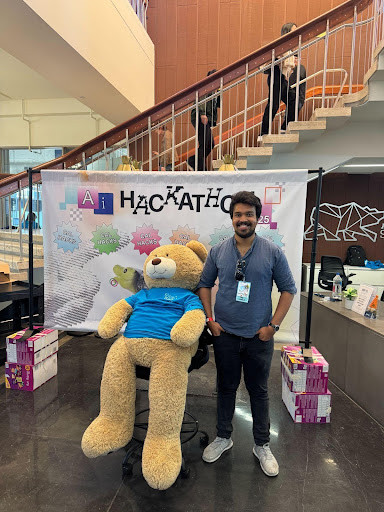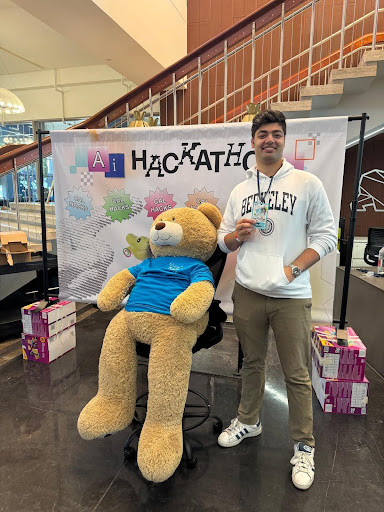Education at the Speed of Curiosity: The Founders Powering AnswersAi

The idea that the education system is flawed isn't new. But it's starting to be reimagined—not with new textbooks or better lectures, but through AI that delivers real-time, personalized instruction.
After the pandemic exposed deep cracks in the system, it became clear that old models simply no longer work anymore, with the students of today expecting learning to be immediate, interactive, and flexible.
That's the future Siddhant Satapathy, Shubhan Dua, and their co-founders Mamoun Debbagh and Bri Wilburn are working toward with AnswersAi, a platform that answers academic questions for students, offering instant support at the speed of curiosity.
More than just a startup success story, AnswersAi shows what education technology (EdTech) can look like when AI moves beyond being just a tool on the sidelines and becomes an integral part of the learning process itself—accessible, personalized, and built around how students actually learn today.
Meet the Founders: Builders, Students, Outsiders—and Now Industry Voices
Siddhant Satapathy and Shubhan Dua bring a unique perspective to the world of EdTech shaped by engineering, data science, and the experience of being students in a system that often left them wanting when it came to support.
Both graduated from UC Berkeley in 2024, but their paths into entrepreneurship began long before commencement. As undergraduates, they were already building systems, raising capital, and solving real-world problems.
Siddhant studied Computer Science and has worked with Uber and Coinbase. At Uber, he engineered pipelines that ingested terabytes of cross-team data to power fraud detection through Uber's internal knowledge graph. His work at Coinbase saw him lead the company's first large-scale security automation effort, handling sensitive data across over 20,000 cloud instances.

Those experiences served him well when he was Lead TA for Berkeley's Data 100, a class of 1,200 students, where he built the grading system under the pressure of a campus-wide TA strike. His experience with bottlenecks, scale, and student frustration gave him a rare, inside-out view of what academic infrastructure could and should look like.
Meanwhile, Shubhan's journey has been shaped by relentless determination and resourcefulness. Born in Ludhiana, India, he had to travel 200 miles for SAT exams and taught himself AP courses without access to formal instruction or prep resources.
He eventually earned admission to UC Berkeley to pursue a degree in Data Science and Economics, but struggled with $150,000 in student loans and no financial safety net. He juggled four internships during college, including roles at Pantera Capital, where he focused on data analysis, and Floating Point Capital Group and Artemis.xyz, where he led impactful AI and data science projects—some of which were later integrated into Bloomberg.
Shubhan also led a 10-member investment team as a Managing Partner at Dorm Room Fund, a $13 million pre-seed fund for student startups backed by First Round Capital and co-investing with a16z, Sequoia, GV, Floodgate, and Y Combinator, with over $8 billion in portfolio value.
Siddhant and Shubhan's shared frustration with academic bureaucracy—slow office hours, inaccessible help, and gatekeeping—brought them together. Getting academic help often meant waiting a long time and relying on systems that simply couldn't keep up with student demand.

What began as a mutual recognition of a broken system evolved into a shared conviction. "My co-founder and I had shared beliefs in the inefficiencies of the current education system and how we could work to disrupt the world of traditional one-to-many instruction,"Siddhant explains.
After experimenting with consumer apps and realizing the potential for AI's scalability, they began building a tool that could offer reliable, real-time academic help.
This was the beginning of AnswersAi.
AI-Native Learning Means Real-Time, Personalized Academic Support
AnswersAi is an AI-native educational platform that's redefining how students access academic help—not through structured courses or one-size-fits-all platforms, but through a system that adapts dynamically to the way they actually think, search, and ask. Whether they're working on math, science, coding or engineering, AnswersAi responds to each question with personalized and context-aware support.
The system behind the tool is a set of proprietary GenAI pipelines explicitly built for academic reliability, speed, and depth. These systems were engineered by Siddhant, who drew from his experience building large-scale infrastructures. This optimized the platform to deliver high-quality answers in under five seconds without sacrificing rigor and accuracy—even in technical subjects where precision is vital.
It doesn't just retrieve facts—it explains, corrects, and guides in ways that replicate the responsiveness of a human tutor, but at a massive scale. For students, that speed and relevance translate into less time stuck, more clarity in problem-solving, and immediate feedback right when they need it.
Scaling with Intention: From Infrastructure to Impact
AnswersAi's potential secured $1.5 million in pre-seed funding from Array VC— one of the largest EdTech pre-seed rounds to ever originate from UC Berkeley. That early vote of confidence was followed by huge momentum as the platform crossed 1.5 million users, answering more than 7 million academic questions and surpassing 1 billion lifetime content views on their social media channel in the process.
Despite this traction, the founders made a deliberate choice not to scale recklessly, focusing instead on building a product rooted in answer quality, performance, and user trust by continuously stress-testing model performance and creating feedback loops.
While much of the consumer AI space has been shaped by short-term virality, AnswersAi has taken a more durable path—building reliable infrastructure that students can trust and depend on.
That philosophy shapes how the company sees itself—not as a chatbot or a homework app, but as an AI-native learning layer that integrates seamlessly into students' daily learning rhythm. Whether they're stuck on a differential equations problem late at night or exploring code during a study break, AnswersAi is designed to be ever-present, responsive, and relevant.
"We're building the product we wish we had—something that makes learning feel intuitive, supported, and never out of reach," says Siddhant.
From Consumer Growth to Institutional Integration
AnswersAi has shown what's possible when technology directly serves the student, but for Siddhant and Shubhan, this is just the beginning of something much bigger.
"I want 100 million questions answered on our platform so that no student has to miss out on quality education due to a lack of money," concludes Shubhan, reflecting on his own experience as a student with limited access to resources and support systems. That goal isn't just about volume—it's about equity.
To make it happen, Siddhant and Shubhan are planning to move from a simple student tool to becoming a formal part of the educational infrastructure—working alongside instructors, embedded in school systems, and integrated into the way learning is delivered across classrooms.
Platforms like AnswersAi don't just hint at what's possible—they challenge us to rethink what should be expected: a future where curiosity drives progress, not privilege; where support isn't delayed by bureaucracy but delivered in seconds; and where personalized learning is no longer a premium feature, but the baseline.
With AnswersAi, Siddhant Satapathy and Shubhan Dua aren't simply anticipating the future of education—they're actively building it.
© Copyright IBTimes 2025. All rights reserved.





















